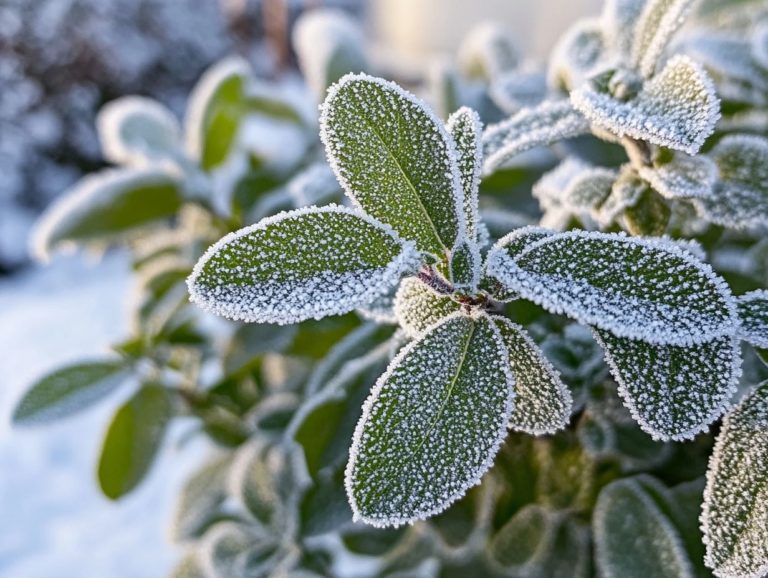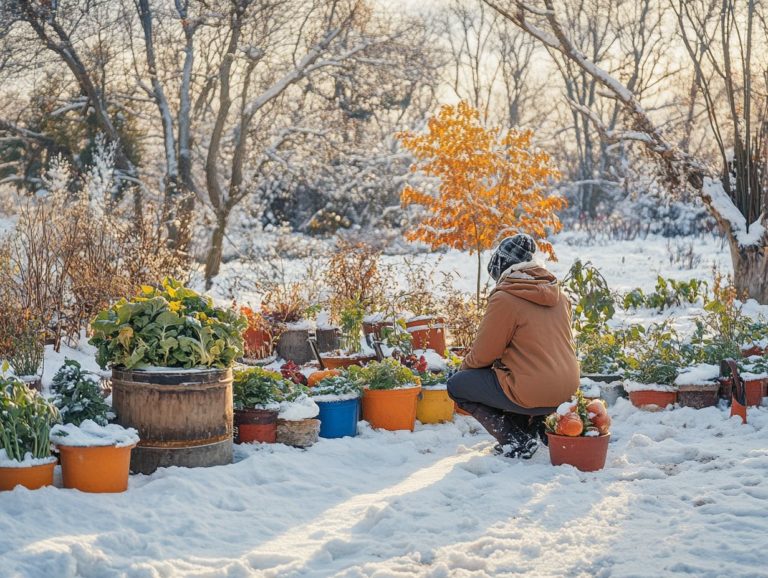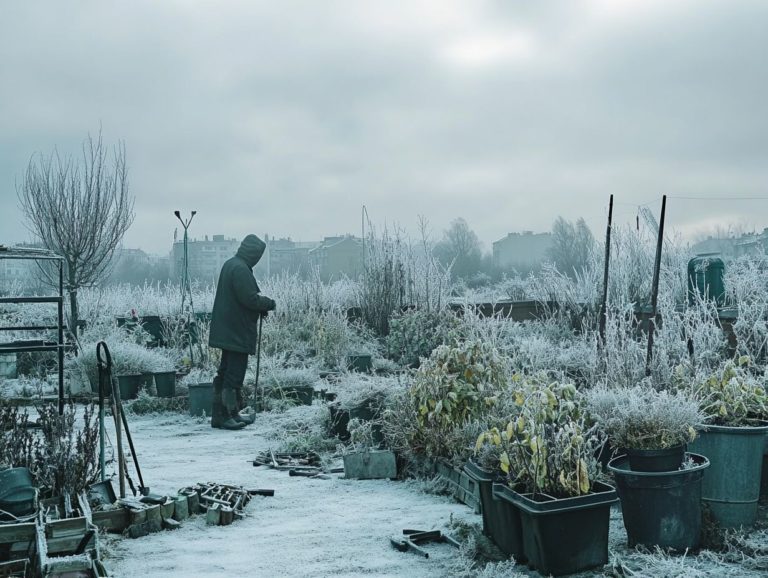5 Best Practices for Winter Herb Care
Growing herbs in winter may appear daunting, but with the right approach, you can transform it into a truly rewarding experience.
This guide will walk you through essential practices, from choosing the best herbs to ensuring they thrive in the colder months. You ll learn how to provide adequate sunlight, master effective watering techniques, and protect your plants from frost.
Delve into the benefits of winter herbs and discover tips for herb maintenance, as well as innovative ways to incorporate them into your cooking and home remedies.
Get ready to grow a stunning winter herb garden that boosts your cooking!
Contents
Key Takeaways:
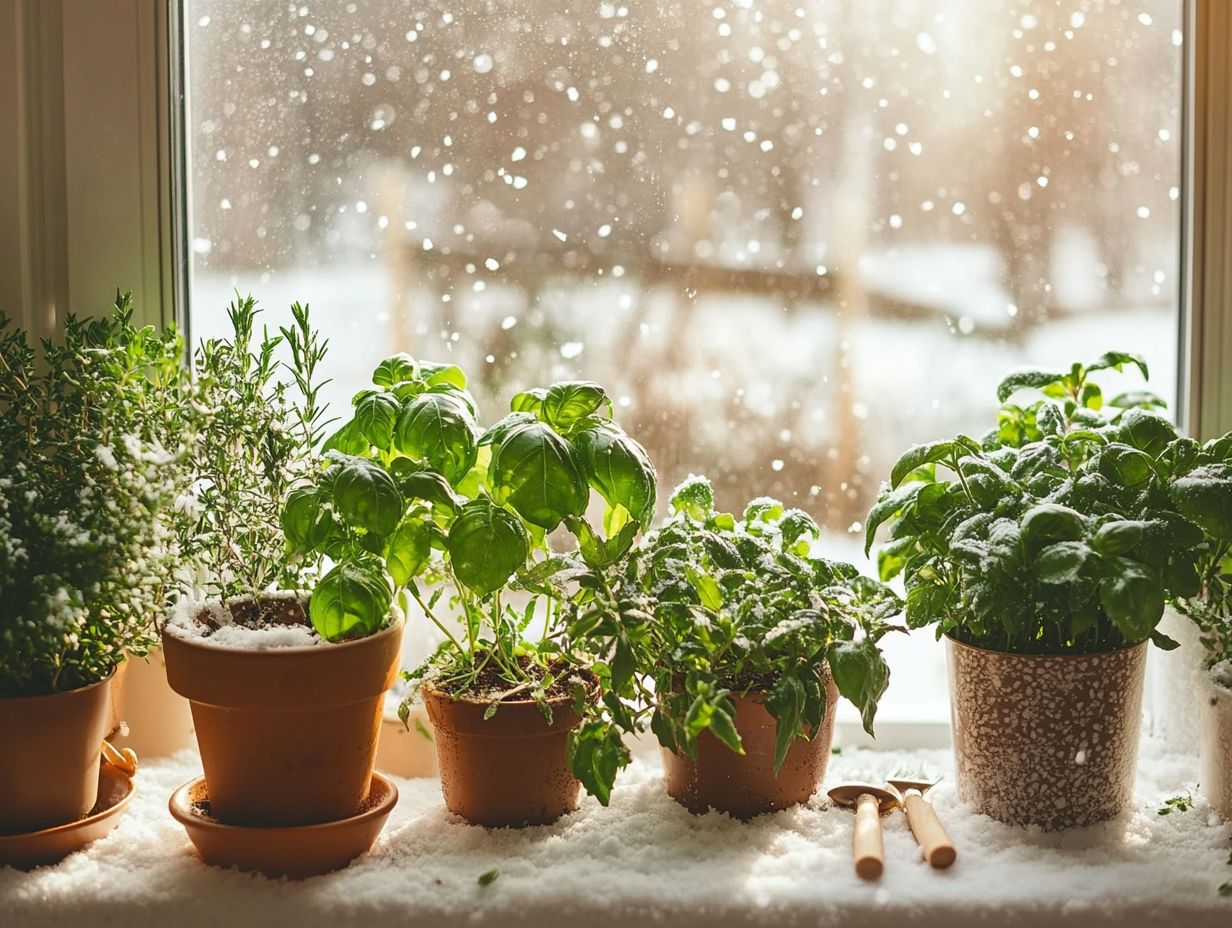
- Choose the Right Herbs: Select winter-hardy herbs and provide enough sunlight for their growth and survival, especially when growing indoors.
- Water and Protect: Water your herbs properly and protect them from frost and cold temperatures to ensure their health and longevity, which is vital for container-grown herbs.
- Care for Your Herbs: Fertilize and prune your winter herbs to promote growth and extend their lifespan. Enjoy the benefits of using them in cooking and home remedies.
1. Choosing the Right Herbs for Winter
Choosing the right herbs for your winter garden is essential for achieving a fruitful herb harvest. It’s all about understanding the specific needs and growth patterns of perennial (plants that live for more than two years) and container-grown herbs.
By selecting winter-friendly herbs like basil, rosemary, thyme, and lavender, you can elevate your kitchen garden, delighting in fresh flavors even during the chillier months.
Knowing your climate zone will guide you in making optimal selections, maximizing the flavors and benefits of your harvest.
These herbs not only infuse your dishes with freshness but also demonstrate resilience against the cold when properly cared for. Take rosemary, for example; its robust aroma makes it a go-to for marinades and roasted meats. Thyme lends a rich depth to soups and stews. Lavender is incredibly versatile, perfect for culinary creations or aromatic purposes.
To ensure these herbs thrive, proper maintenance is key. Shield them from harsh winter winds and provide well-draining soil (soil that allows water to flow through it) to prevent root rot. By following the best practices for winter planting and tailoring your care to suit the local climate and seasonal changes, you’ll set the stage for these herbs to flourish, enriching your culinary experiences throughout the winter months.
2. Providing Adequate Sunlight
Providing adequate sunlight is crucial for growing indoor herbs, as they thrive on direct light to develop their rich flavors throughout the winter months. You can utilize a sunny windowsill or incorporate grow lights to significantly boost herb growth, ensuring your indoor gardening efforts yield fresh, healthy herbs even when it’s cold outside.
To optimize light exposure, consider placing your herb containers near south-facing windows, which capture the most sunlight throughout the day. If natural sunlight falls short, especially during those shorter winter days, using grow lights can be an excellent alternative. Set these lights to provide around 12 to 16 hours of light daily, allowing your herbs to mimic their natural growing conditions.
For the best results, opt for LED grow lights that emit a full spectrum of light, enhancing photosynthesis. This thoughtful combination of proper placement and supplemental lighting will ensure your herbs remain vibrant and productive.
3. Proper Watering Techniques
Proper watering techniques are essential for maintaining the health and vitality of your herbs throughout winter. To enhance your indoor gardening experience, consider following 5 tips for successful indoor winter gardening. Many indoor plants experience varying soil moisture levels, greatly impacting their growth and longevity.
By understanding how to assess the moisture in the root ball and adjusting your watering practices, you can enhance herb survival and overall health. Overwatering typically reveals itself through yellowing leaves and wilting despite soggy soil, while underwatering shows as dry, crispy leaf edges and soil pulling away from the pot.
To achieve optimal soil moisture, check the top inch of soil before watering to ensure a balance that supports healthy root growth. Opting for a well-draining potting mix will help prevent excess moisture retention. Adding pot feet improves air circulation and drainage beneath your containers, preventing water from pooling.
These practical adjustments can significantly promote the well-being of your indoor herbs during the colder months, especially if you follow 5 tips for starting a winter garden.
4. Protecting from Frost
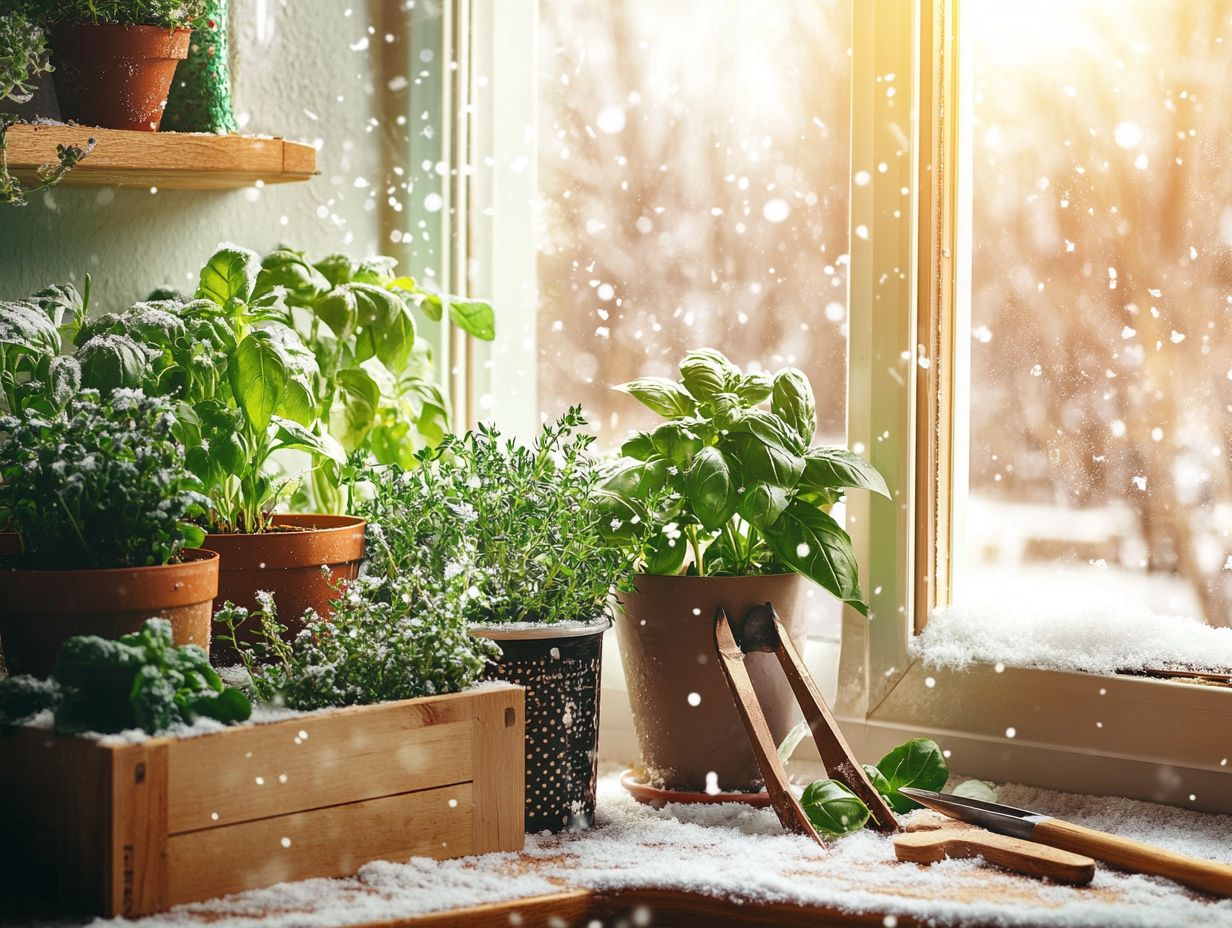
Protect your herbs from frost to ensure their survival during winter, especially for container-grown herbs vulnerable to harsh conditions. Use frost protection methods like horticultural fleece or bubble wrap to insulate your herb containers, creating a barrier against freezing temperatures.
Implementing cold frames is an excellent strategy to safeguard your plants, as they create a small area with different weather conditions than the surrounding area. Act quickly to protect your herbs before the first expected frost in your area, usually in late fall.
Use old blankets or burlap sacks for extra insulation, trapping heat during particularly chilly nights. Combine these techniques to maximize your herbs’ chances of survival for a bountiful return come spring.
5. Fertilizing and Pruning for Winter Growth
Fertilizing and pruning are essential practices to maintain healthy winter herbs. Proper care ensures robust growth and flavorful harvests throughout the colder months. To enhance your gardening efforts, consider following the 5 best practices for winter soil care and implement effective trimming and leaf pruning techniques to encourage new growth and manage herb varieties like basil and rosemary.
Incorporate organic fertilizers such as compost or fish emulsion to enhance your soil quality. Apply fertilizers during the growing season for best results, maximizing nutrient absorption to give your herbs the best chance to thrive.
Regular pruning, especially early in the growing season, stimulates branching and improves air circulation around your plants. Topping basil encourages bushier growth, while snipping excess leaves from rosemary maintains its structure and helps prevent disease.
Mix all these techniques for thriving herbs that will elevate your culinary creations and support a sustainable gardening approach.
What Are the Best Herbs to Grow in Winter?
The best herbs for your winter garden encompass a delightful variety that not only survives but flourishes in colder temperatures. They impart unique flavors to your culinary creations. Consider rosemary, thyme, and sage excellent choices known for their resilience. These herbs elevate winter dishes with their aromatic profiles, ensuring a bountiful harvest even when the weather is less than inviting.
For those feeling adventurous, adding dill or parsley to your winter herb lineup offers distinct tastes that enhance a range of recipes. As you select these herbs, pay attention to their specific needs. For example, rosemary thrives in well-drained soil and needs plenty of sunlight. Sage also does well in similar conditions and can handle slightly harsher climates.
Look for vibrant green leaves they show your herbs are fresh and ready to thrive! This is a key factor in successful herb selection.
By incorporating a mix of these hardy herbs, you enhance the flavor of your hearty winter meals. At the same time, you keep your garden vibrant and lively during the cold months. Don’t miss out on creating a lively winter garden!
How Can You Create a Suitable Environment for Winter Herbs?
Creating a suitable environment for your winter herbs requires a delicate balance of temperature, light, and soil moisture to optimize growth and flavor. To learn more, check out the best practices for winter gardening. Choose herb containers that ensure proper drainage and position them to capture sunlight. This way, you can cultivate an indoor gardening space that nurtures your winter herbs effectively.
Aim to maintain your indoor spaces between 65 and 70 degrees Fahrenheit during the day. Allow the temperature to drop a few degrees at night for optimal growth.
Monitoring humidity levels is crucial for herb survival. Keeping humidity around 40-60% provides the moisture your herbs need to thrive while preventing pesky mold growth.
Consider using devices that measure how wet the soil is. Water your herbs when the top inch feels dry, ensuring the roots stay hydrated without becoming waterlogged.
Incorporate grow lights to supplement natural sunlight, especially during those shorter winter days. This will enable your flavorful greens to receive the right amount of light, setting the stage for optimal growth.
What Are the Common Mistakes in Winter Herb Care?

Don’t let common mistakes ruin your winter herb garden! To avoid pitfalls, consider following 5 essential winter gardening tips for success, as mistakes in winter herb care can hinder your plants’ growth and overall health.
Pay close attention to watering, sunlight exposure, and pest control. Neglecting these can lead to undesirable outcomes.
One frequent error is over-watering, which can cause root rot. Under-watering leads to wilting and stunted growth.
To avoid these issues, monitor how wet the soil is with a quick finger test. It’s an easy way to gain clarity!
As seasons change, adjusting your care routine becomes essential. Your herbs need adequate sunlight during shorter winter days.
Too little light can result in elongated and weak herbs. Position your plants near sunny windows or use grow lights to enhance their growth.
Ignoring pests like aphids or spider mites can wreak havoc on your plants. Regular inspections and natural remedies can keep these nuisances at bay.
Let your winter herbs thrive in winter s embrace with proper care!
How Can You Extend the Lifespan of Your Winter Herbs?
Extending the lifespan of your winter herbs requires proactive maintenance. Following essential cold-weather crop maintenance tips, such as proper acclimation and regular pruning, promotes healthy growth.
Remove any dead or damaged branches during winter. Use effective pruning methods to keep your plants healthy.
Monitor environmental conditions closely. Protect your herbs from frost by covering them with frost cloth or moving them indoors.
Select cold-hardy herbs and plant them in sheltered areas to minimize frost damage. This ensures they receive adequate protection.
Start by acclimating new plants to their indoor environment. This gradual adjustment helps them adapt to temperature and humidity changes.
Prune at optimal times to stimulate new growth. Removing dead or overgrown foliage helps prevent diseases.
As seasons change, adjust your care routine. Managing light exposure and watering frequency is essential.
Ensure your herbs get enough sunlight during shorter winter days. Proper moisture management greatly impacts their health.
What Are the Benefits of Growing Herbs in Winter?
Growing herbs in winter offers many benefits. You can enjoy fresh herbs that elevate your culinary creations and support a healthy lifestyle.
The unique flavors and aromas of winter herbs enhance your dishes. They also provide delightful elements for home remedies.
Fresh herbs are packed with essential vitamins and minerals. They help bolster your immune system during colder months.
Growing herbs at home allows you to add freshness to your meals. Think of fragrant rosemary in hearty stews or vibrant basil in comforting soups.
Nurturing a winter garden brings profound joy. Witnessing your herbs thrive fosters a deeper connection to nature.
This experience sparks creativity in the kitchen, turning every meal into an exciting opportunity for exploration.
What Are the Different Ways to Use Winter Herbs in Cooking and Home Remedies?
Winter herbs can transform your cooking skills and home remedies, offering a unique blend of flavors that infuse warmth and richness into your meals. Whether you re using herb cuttings or preparing them fresh, these versatile plants open the door to creative cooking and natural health solutions, enhancing both your kitchen and your home remedies.
Incorporating these aromatic wonders into your everyday cooking is not just simple; it’s incredibly rewarding. Imagine adding them to hearty soups and stews, where their robust flavors meld beautifully during the simmering process. A sprinkle of winter herbs in your marinades can elevate the taste of meats and vegetables alike, turning ordinary dishes into extraordinary ones.
If you want wellness benefits, herbal teas made from these plants are perfect. They offer soothing warmth and can even give your immunity a little boost. Consider using them in homemade tinctures or balms, tapping into their natural properties to tackle common winter ailments like colds and fatigue. Dive into the magic of winter herbs and transform your cooking and wellness today!
Frequently Asked Questions

What are the top 5 best practices for winter herb care?
The top 5 best practices for winter plant care include providing adequate sunlight, proper watering, protecting from frost, fertilizing, and pruning.
How much sunlight do herbs need during the winter?
Most herbs require at least 6 hours of sunlight per day, but some may need more or less depending on the specific herb. It’s important to research the sunlight needs of your particular herbs and adjust their placement accordingly.
How often should I water my herbs during the winter?
It’s important to regularly check the soil moisture of your herbs and water whenever the top inch of soil feels dry. Typically, herbs need slightly less water during the winter compared to other seasons, but it’s important not to let them dry out completely.
How can I protect my herbs from frost?
To protect your herbs from frost, you can cover them with a frost cloth or blanket, or bring them indoors if possible. It’s also important to choose cold-hardy herbs and plant them in sheltered areas to minimize the risk of frost damage.
Is fertilizing necessary during the winter?
While herbs don’t typically require as much fertilizing during the winter, it’s still important to provide them with nutrients to promote healthy growth. Use a light application of a balanced fertilizer once a month during the winter.
Why is pruning important for winter herb care?
Pruning helps to promote new growth and maintain the health and shape of your herbs. It’s important to remove any dead or damaged branches during the winter, as well as to prune back any overgrown or leggy herbs.
Feel free to share your experiences or tips about using winter herbs in the comments below!


